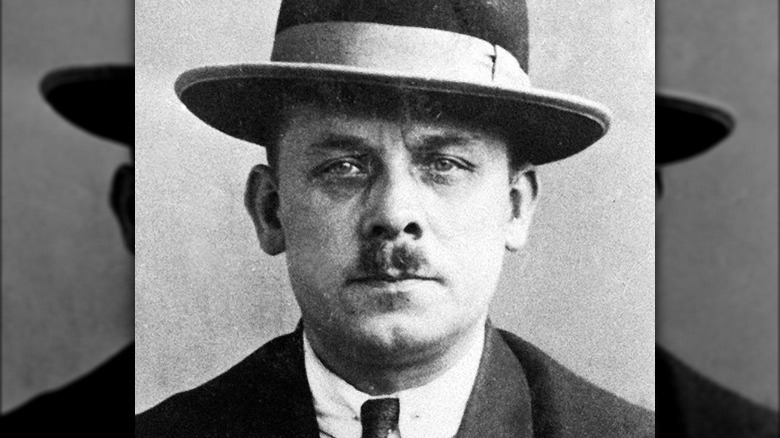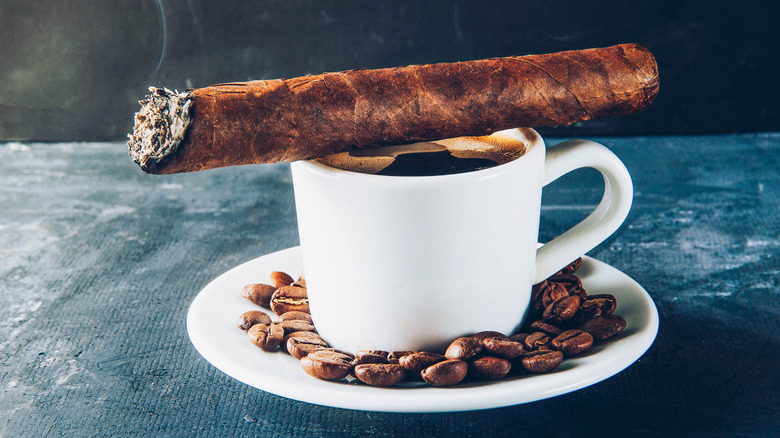What The Butcher Of Hanover Fritz Haarmann Had As His Final Meal
Have you ever wondered what the "last things" in your life would look like? What's the last movie you'd ever watch? What's the last book you'd ever read? What's the last song you'd want to hear? The finality of death seems to illuminate those things we value most in life, so when the bell tolls for you and it's your time to leave this world, you'd better make sure you've had your fill of all the good things, including and perhaps especially your favorite food. That seems to be the message we relay to death row inmates, at least. According to U.S. News & World Report, some of those delivered the dreaded verdict of capital punishment are afforded the right to a final meal of their choosing, and as long as the demands aren't unreasonable, they're generally granted their edible wish.
Even infamous serial killers aren't robbed of this luxury. While you likely have very little in common with someone like Jeffrey Dahmer or Ted Bundy, there's always the off chance that your favorite food might actually have been theirs as well. According to a report by 9 News, Bundy was presented a hearty breakfast of champions for his final meal: toast, coffee, steak and eggs, and more — though shockingly, he didn't take a single bite. On the other hand, Fritz Haarmann, the so-called "Butcher of Hanover," took his final request a bit more seriously and made sure he crossed over the threshold of death with the memory of one last indulgence.
Who was the 'Butcher of Hanover'?
Fritz Haarmann, sometimes called the "Vampire of Hanover," was a German serial killer who earned his nickname by kidnapping, killing, and dismembering young boys and men. Most of his victims were between the ages of 13 and 22. He preyed on the city of Hanover, Germany, throughout the 1920s. According to Morbid Anatomy, Haarmann insisted that he was responsible for up to 70 different murders, though his claims could not be confirmed by investigators, authorities, or historians. However, the 24 homicides he was in fact convicted of were enough to earn him the death penalty.
At the time, the term "serial killer" wasn't part of the vernacular (Psychology Today dates it to 1974), so news outlets in Germany had to settle for more poetic labels like "butcher" or "vampire." As 9 News reports, Haarmann was also in the habit of sexually molesting his victims, adding to his terrifying reputation. The fact that he had a predilection for biting through the throats of the young men he captured, killing them in the process, also contributed to the "vampire" characterization. After a two-week trial that featured no less than 200 different witnesses, the Butcher of Hanover was sentenced to die by beheading beneath the blade of the guillotine. "Condemn me to death. I ask only for justice. I am not mad," he declared before the court. "Make it short; make it soon. Deliver me from this life, which is a torment" (via The Lineup).
What was Fritz Haarmann's final meal?
For some of us, quality trumps quantity any day. Instead of a big juicy cheeseburger that's dripping with condiments galore and buckets of grease from every pore, we'd prefer a quaint little dish of caviar and crackers. Some call it an appreciation for the finer things in life, but whatever Fritz Haarmann called his final meal request, you could definitely say it was slightly unusual. According to 9 News, it wasn't a steak or even a plate of caviar that the Butcher of Hanover enjoyed on the eve of his death. Instead, he chose to leave this life after enjoying a fine cigar and a piping hot cup of Brazilian coffee.
On April 25, 1925, Fritz Haarmann's head was removed from his body via guillotine, which was the custom of execution in Germany back then. He wasn't informed of his death date until the day before he was killed (per The Lineup).


